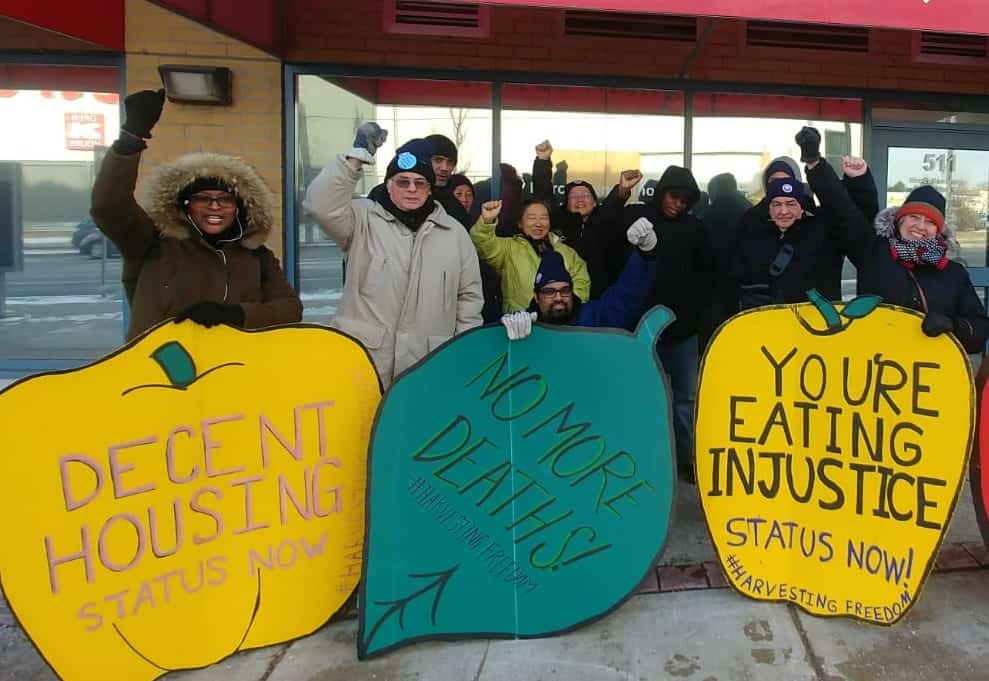On International Migrants Day, the NFU Calls for Government Action to Address Systemic Injustice of Canada’s Temporary Foreign Worker Programs
NEW HAMBURG, ON- Migrant farm workers in Canada are frequently mistreated, subject to unsafe working and living conditions, discriminated against, and denied and/or prevented access to basic health and safety measures. These systemic problems with Canada’s temporary foreign worker programs for agriculture are not going away. We call on the federal government to resolve the farm labour crisis in ways that enhance the country’s food security while avoiding the continued reliance on the exploitation of migrant workers.
Every year since 1996 when the Seasonal Agricultural Worker Program (SAWP) first began, credible allegations of worker mistreatment and abusive exploitation have been documented. On December 18th, International Migrants Day, the National Farmers Union is saddened to report that this year has been no different. In July,migrant advocatesin Nova Scotia protested the exclusion of temporary foreign workers from public health insurance. In August, the CBC reported that Niagara region migrant farm workers who grow our food were themselves food insecure. That same month, Jamaican workers who held a one-day strike to protest abysmal workplace conditions were deported rather than having their situation remedied.
In September, UN special rapporteur on contemporary forms of slavery, Tomoyo Obataka, reported on our country’s Temporary Foreign Worker programs:
I am deeply disturbed by the accounts of exploitation and abuse shared with me by migrant workers [in Canada]. … Employer-specific work permit regimes, including certain Temporary Foreign Worker Programmes, make migrant workers vulnerable to contemporary forms of slavery, as they cannot report abuses without fear of deportation.
As the UN special rapporteur’s report, the auditor general reports, the COVID-19 coroner investigations, migrant rights organizations, and countless media reports confirm, the failings of our temporary foreign worker programs are not simply a problem of a “few bad apples” among our agricultural employers. These failings are the result of federal programs that are designed to maintain a cheap food system at the expense of the people who grow our food. Closed work permits mean that temporary and migrant workers are unable to leave jobs with dangerous work or living conditions and secure safe and fair employment.
In the face of ongoing revelations of systemic problems with our temporary foreign worker programs, the agri-food industry has only increased its reliance on these inhumane and unjust programs, with a record 38,928 general farm workers arriving via the SAWP program in 2022. Following criticisms from the UN Special Rapporteur, the Canadian Government did not move to reform the system but, instead, made it easier for employers to bring migrant workers into the country, reinforcing the inequities and precariousness the temporary foreign worker programs create. If producing food is an essential service, why aren’t all agricultural workers afforded the full rights of other workers in Canada and the legal agency to avail themselves of these rights?
A Senate Committee and a House of Commons Standing Committee are investigating the problems inherent in our temporary foreign worker programs. It’s time to stop defending the status quo, acknowledge the problem, and take action to address the systemic issues. We need the Canadian government to commit to the following interventions (outlined in more detail here):
- Immigration, Refugees and Citizenship Canada (IRCC) needs to develop a dedicated immigration stream for agricultural workers. We must invite these essential, skilled, and experienced workers to Canada through direct pathways to permanent residency.
- Until such time as Canada has increased our resident agricultural workforce through immigration and/or through government-funded agricultural training and affordable land access, the government needs to enact policies that ensure labour mobility for all temporary and migrant farmworkers. Closed work permits need to end.
- The regulatory compliance overseen by Employment and Social Development Canada (ESDC) is not being effectively enforced. Even with the 2021 increase in funding for agricultural inspections, many employers continue to be allowed to hire migrant workers in spite of their being responsible for serious infractions that have compromised workers’ health and safety. ESDC needs to improve its enforcement practices and prove to Canadians that it is not subject to corporate capture.
We call on the federal government to resolve the farm labour crisis by enacting an agricultural labour strategy that enhances the country’s food security while avoiding the continued reliance on a tier of workers who are denied and/or prevented from exercising fundamental human and labour rights. We further call on the federal government to ensure these rights by adopting and implementing the U.N. Declaration on the Rights of Peasants and Other People Working in Rural Areas (UNDROP) and by signing and ratifying theInternational Convention on the Protection of the Rights of All Migrant Workers and the Members of their Families.
—30—
For more information:
Jenn Pfenning, NFU President and co-chair of the NFU’s Migrant Worker Solidarity Working Group (MWSWG): president@nfu.ca
Wyanne Sandler, farmer and co-chair of the NFU’s MWSWG: ipccoordinator@nfu.ca
